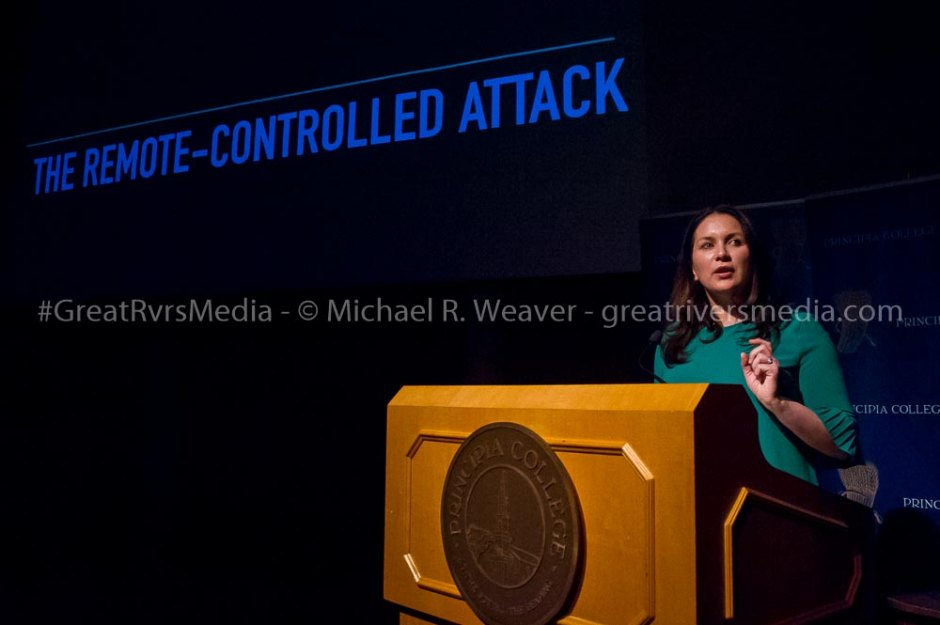Your Ad Could Be Here - For As Little As $25 Weekly! - Call 618-494-2068
The Unknown Terrorists Among Us
ELSAH - This story was originally slated to be about an address by Rukmini Callimachi at Principia College. Principia brings speakers from many disciplines to their campus and Callimachi was this years Ernie and Lucha Vogel Moral Courage Speaker.
According to the Principia website, the "Vogel Moral Courage program was established to nurture, encourage, and promote the idea of moral courage through speakers, seminars, and special activities as well as a special collection located in the Marshall Brooks Library. The speaker series has brought to the Principia College campus individuals from around the world who have been significant exemplars of—or writers on—moral courage. The purpose of the speaker series is to foster an appreciation of the importance of moral courage in every aspect of life."
Callimachi is a reporter for the New York Times and her focus is coverage of ISIS. Within days of her address on the Principia campus, a terrorist used a truck to kill people in New York City. The methods used for communication and radicalization appear to be exactly as Callimachi explained during her talk. She was able to have the audience using one of the online platforms within minutes after giving instructions.
The terrorist has been driving through our region as a semi-truck driver and was arrested in St. Charles County, MO on an outstanding warrant from Platte County in 2016. He posted bail of $200.00 and was found guilty when he failed to appear for court in November 2016. His bail was used to pay the fine and associated court costs.
We all see how online media and social networking platforms allow us to insulate ourselves. We can, if we wish, hear or read only what we choose to. We see it in the polarization of our own politics and government. Things that were once fact checked are not but are seen by some as fact based news.
Callimachi asked me if the area by the St. Louis airport was dangerous. She said that she had wanted to stop at a particular business when being picked up from the airport but that her driver refused to allow it and told her it was not a good idea for someone like her to do that. I told her that I wasn't afraid to walk in most places around there but that I'm a 6'4" guy. I explained that she shouldn't be worried. Especially considering where she has been reporting. We both laughed about it and talked for nearly an hour.
The following interview of New York Times reporter Rukmini Callimachi is an enlightening and cautionary tale of the world we live in today.
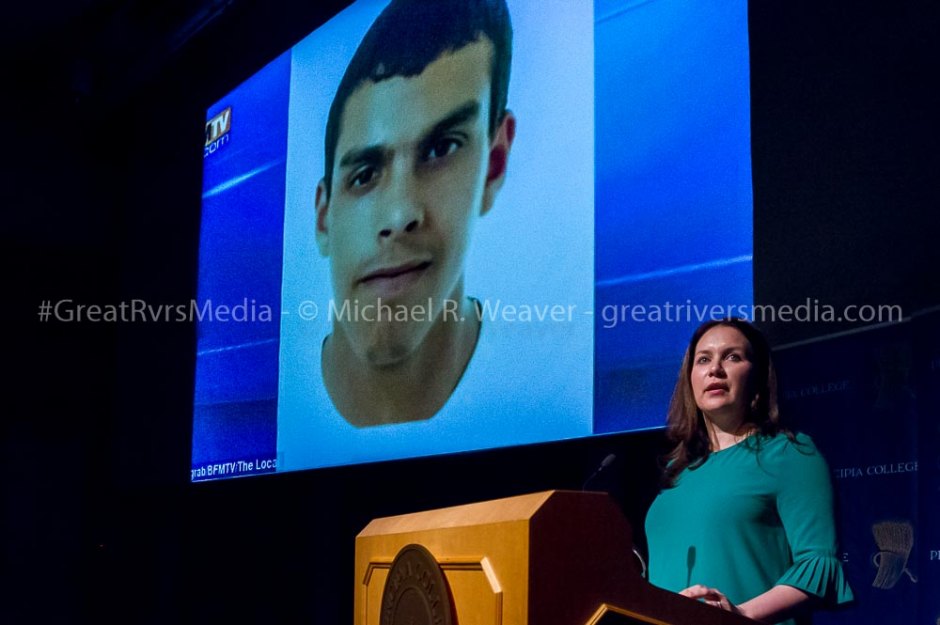
Q - I read about how you wanted to do poetry but you figured that was a dead end.
A - I didn't figure that was it after I realized that I would get paid you know fifty bucks for something I've worked months on. It took me a while to figure out that what I what I really enjoyed doing was traveling, meeting people and writing. I actually find writing quite hard. I like socializing with other people. Journalism was the one thing that that got me out there, got me to meet people and then allowed me to turn it into something that was written. I came to it late. I think I was twenty seven when I got my first newspaper job in 2001. When it when it finally dawned on me this is what I want to do, there was an accompanying sense of panic which is that I am like looking down the barrel of my 30th birthday and I'm basically the most junior reporter at the third largest paper in Illinois, The Daily Herald in Arlington Heights. My aim is to become a foreign correspondent.
Q - How did you get on the Times radar?
A - I got on the Times radar as I was basically applying to them for ten years. It was sort of like throwing a dart at a dart board. Just hoping it eventually lands. The thing that finally got me on the radar was in 2013 I was the West Africa bureau chief for The Associated Press. I was based in West Africa and I covered a twenty country beat. One of the countries that I covered was Mali in Western Africa. In that year, an al-Qaeda's North African branch invaded the North of the country and literally took over half the country within a couple of days. They controlled a territory that was the size of Afghanistan.
Q - Are those people so brutal that they do it that quickly or is there enough sympathy there that people don't think it's that bad when it first happens?
A - It was the fact that the country had imploded. In the capital they had a coup d'état. The country had been democratic for two decades, which for that area was good. But it basically just fell apart overnight and in the south the political class just imploded. In the north these rebel groups started to move down and al-Qaeda piggybacked on them and then swept in. It was like we saw on Mosul in 2014. The Malian military just literally up and ran. I was collecting anecdotes about how they were ripping off their uniforms. One guy shows up in his underwear, got in the back of a truck and was just whisked off. They are just trying to save themselves. That was in 2012.
In 2013 the French went in and pushed them back. I was able to move behind them. They got to the city of Timbuktu. It's an actual city in Mali. I got there three days or so after the city had been liberated from al-Qaeda. The stunning thing is that al-Qaeda had left in such a hurry that they didn't have time to clean up their stuff, so I started going building by building and I recovered around five thousand pages of their internal documents.
January 2013 was a point in time in our politics where Osama bin Laden had been killed at the end of 2011, so basically not even not even a year and a bit since Osama bin Laden had been killed. The rhetoric coming out of Washington was that al-Qaeda had been decimated, al-Qaeda is on the run. These other groups outside of Pakistan and Afghanistan have no real connection with al-Qaeda, they're just about the criminals that are opportunistically taking on the al-Qaeda name.
Among the material I found were letters from the general manager of al-Qaeda, this famous guy Nasir al-Wahishi who ends up dying in a drone strike years later. So I found these letters from the general manager of Al-Qaeda who's sitting in Yemen. These letters had been hand carried across the desert, giving detailed instructions to the guys in Mali about how to run things. Among his pieces of advice was make sure to keep the lights on because people tend to rebel if they don't have electricity. Good tip number one you know. So I suddenly realized I had been reporting on this terrorist group like every other reporter by calling analysts in Washington by trying to get interviews with high placed officials. I realized that what was coming out of Washington, at least about al-Qaeda was a lie. I don't know if it was an intentional lie or if it was just a lack of understanding of this group.
That was a real ah ha moment for me that changed how I do things. I now report on this group full time. al-Qaeda splits into two and part of it becomes ISIS and that's become my main focus but I spend as much time trying to speak to the group and trying to read and recover their records because I think that that's as telling, if not more, than what the government is telling us. The reason is that terrorist attacks are one of the most politicized things. A terror attack on the watch of any President is probably the biggest black mark that they can have. The American people have a tolerance equal to zero for these attacks.
For instance, during the Obama administration, you saw them doing semantic games to try to explain how Orlando was not an ISIS attack. The guy pledged allegiance to ISIS in the 911 call and he didn't just do it once he did it repeatedly. He told the people he was holding hostage that this is why he was doing it. So when you listen to the 911 call, it's like five or six times that this guy says I pledge allegiance to Baghdadi. That attack was portrayed as an inspired attack, as a lone wolf attack. The reason for that is that there's a very big political cost to having an attack on your watch. Because of the politics that are played around terrorism, I feel that the group is as secretive as it is. It's really hard to get information on them but then on top of it you have political spin. I found my niche trying to explain this group to the world.
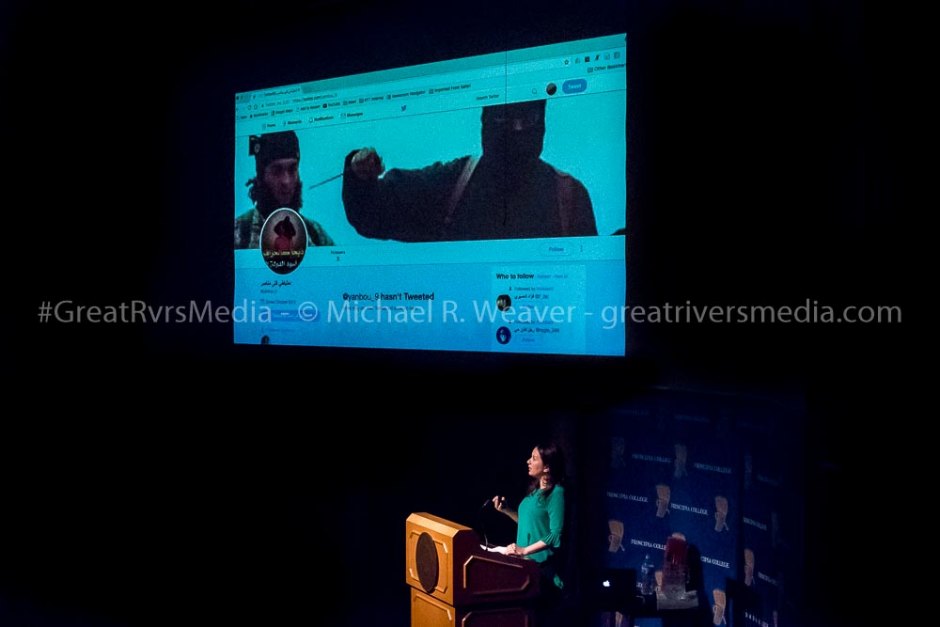
Q - How much success did you have by trying to contact them directly?
A - Because I'm a woman, some of them don't talk to me at all, but then it also means that when they do talk to me they break a barrier. Suddenly you're like in this "oh my sister" kind of kind of territory. Which is useful in that they're at least interacting with you. There was a golden period I would say in 2012, 2013, and part of 2014 before they were hunted in the way that they became hunted after the execution of James Foley. There was a bit of a détente, America was not really going after ISIS and they were all over social media. You could send them a DM on Twitter or you could get in touch with them on Facebook.
In one instance this was an al-Qaeda commander in Mali. They held that territory Mali for almost a year and nobody was attacking them. They were completely left to their own devices. This guy was appointed the spokesman of the group and so he started giving out his phone number to reporters. So I used to call him.
Q - What did the people who live there think of them?
A - There is a pattern with them. Initially they're sometimes welcomed as they always bring security. So people that were living in this chaotic area where there was banditry, women were being raped and you couldn't drive very far without somebody trying to put a stake in your tire and take your livestock gave them good points for that. Usually they're good at cutting down on corruption so they get good points for that but then they very quickly go bonkers. In Mali they found a guy who was accused of murder and they sentenced him to death. They did this spectacle in the center of the town where they invited the mother and brother of the victim and then tried to put the pistol in her hand and she didn't want to touch it. Then they tried to give it to the brother he's like I don't want to touch that and then they shot the guy in front of them. I went to interview the mother and they were really confounded. On the one hand they were sort of happy that the guy who had done harm to their kid had been dealt with but on the other hand it was really gross. So they start doing stuff like that and very quickly people are turned off and very frightened.
I was there for the liberation of Timbuktu. Women were literally dancing in the streets, ripping off the hijab, listening to music. Music was not allowed, putting on makeup. Makeup was not allowed. I remember stopping these girls who were walking, there are no paved roads, it's all sand . I see these girls who are walking in Kitty heels in the sand just because they want to show off their nice clothes that they haven't been able to wear for a year or so.
Q - On the basis of you doing that and putting yourself in that position, was that when the Times noticed you?
A - That was when the Times called me as opposed to me continually you know throwing my darts at the Times. It's so funny, at the Times when they're interested in you, then suddenly you know this project that had taken a decade, suddenly I couldn't get there fast enough. I was negotiating for like every extra day to be able to move my stuff from Africa and they wanted me now, now, now. So that's the way it goes I guess.
Q - So AP didn't want to pay you more money?
A - AP countered with this insane offer to increase my salary by forty percent or something but at a certain point it's no longer about the money you know. I was starting to be really frustrated at the AP. At the AP, every single story had to be accompanied with a proposed budget. How much is this going to cost? Then you're basically horse trading with the editor. Can you maybe do the trip in seven days instead of ten days? Can you stay at this hotel instead of that hotel? That kind of discussion actually at a certain point almost becomes dangerous when you're talking about a place like Mali. Or a place like Mosul where if you start cutting corners, pretty soon you're cutting corners on an expensive hotel that is often a better guarded hotel.
So for example in Mosul with the New York Times, as a rule and this is something that even I cannot break if I wish to break, this is from our security people, we do not go to Mosul unless we are going in a convoy. If I'm the only reporter going the second car just follows behind because you can't afford to break down in these areas and not have a way to get out.
In Mali I did the entire trip in a single car. You know in retrospect that wasn't such a smart thing to do. If I had tried to ask for a second car I would have been told that it's too expensive.
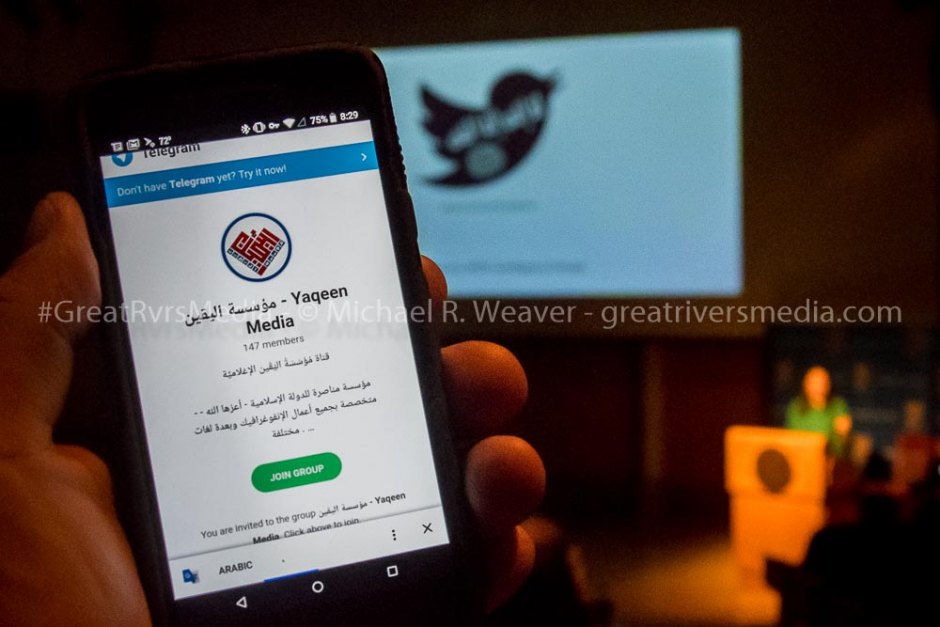
Q - So now you've gone to the Times. What are the stories that you're following now or that you have followed that you have that you think are the most important? From a society point of view that we really need to pay attention to?
A - The easiest way to answer that is like I mentioned before. There's a lot of politics around terrorism so every single time there is a terrorist attack, there's the truth of the investigation and then there's what officials tell us about the investigation and very often they will try to tell us right after that this had nothing to do with ISIS. It's hard for me to somehow untangle how much of this is intentional and how much of this is just people either being naive or being uninformed. So the first major ISIS attempt to attack the homeland was in 2015. It was in May of that year and it was in the state of Texas in the town of Garland where there was a community center that was hosting a prophet Mohammed cartoon competition.
Two guys, who had been in touch with one of the most famous ISIS recruiters who was in Syria, decided to go and attack it. Thank God the FBI was tailing them. And thank God the community center was alerted because they had security and when they got to the community center to open fire they were gunned down before they were able to hurt anybody.
But I remember when we did that story officials were so loudly denying that ISIS was involved that the first story that wasn't written by me, but by me but by a colleague, didn't even mention ISIS.
Yet I could see on the Twitter timeline of the main shooter that he was talking to this well known ISIS recruiter and that right before he got to the community center he pledged allegiance to Baghdadi in a tweet and his very last tweet was "Follow this guy in Syria". As soon as the attack happened the guy in Syria started going Allahu Akbar, Allahu Akbar on Twitter. Praising it and then propagating it. So he wanted all of his followers to say follow this guy who is then going to give you the good news after. It was just self-evident that ISIS had at least a digital connection to that attack and it wasn't really until literally a few weeks ago that a colleague of mine found a document where the Defense Intelligence Agency admits that this attack was part of ISIS's external attacks
Q - What's the name of the news agency that the terrorists use?
A - Amaq. The AP of ISIS. I'm going to really annoy my former employer.
Q - You could say they are the UPI.
A - Yeah, but UPI is dead, so...
Q - I understand how these social media and communication platforms are somewhat disingenuous by how they handle complaints. Understanding that in this country we have our first amendment protections, why does this have to be so hard to solve?
A - The thing is, if you look at the way Twitter is handling ISIS accounts is now they're starting to get it. These accounts I used for the presentation tonight, I found an account two days ago and I created a little video and screen grabs of it that I wanted to show the audience members. It was suspended this afternoon. So OK it was alive for like two and a half days. That's a lot better than it used to be which was weeks at a time. But it was still alive for two and a half days. The shame of all of this is that these social media platforms, and it's not just Twitter, but Facebook,YouTube, but all of them. They only got their act together in reaction to the enormous blowback that they got, the criticism that they got in the media and then finally the lawsuits by the families of the Paris victims, by families of the San Bernardino victims, by families of the of the of the Orlando victims who haven't succeeded in making this argument because of our First Amendment protections. But they're blaming the social media engines for playing a role in the recruitment and radicalization of the men who kill their children.
Q - How do you get your information from an official standpoint? Do you have any luck with Freedom of Information Requests (FOIA) or are they so heavily redacted that it's not really useful?
A - I've had zero luck with them. I've put in a whole bunch of them. First of all they take years. One set of FOIA requests that I put in was to try to figure out the ransoms that had been paid for Western hostages. I broke it up by region and after like two years of the request being denied, our lawyers were involved the whole way, they finally gave me this document where almost all of it was redacted except that the sentences that were sourced to the media. So basically they're giving me back what we ourselves have published . There are some reporters who have had really good luck with FOIA. That's just that's something I haven't cracked. I haven't figured out how to how to do that right.
Q - It's possibly because of who you are.
A - Well I'm always asking for stuff that touches on national security. Maybe I'd have better luck if I was FOIA'ing the number of hours that employees of Chicago City Hall spent golfing. Something that's less sensitive.
Q - Do you think do you think that the powers that be that are supposed to be protecting us, do you think that they are adequately trained or looking in the right places? Are these people good intentioned but sometimes clueless because they're so narrowly focused that they miss the bigger picture?
A - I think there's two things that happen.
One is that I've seen officials get tunnel vision based on whatever the politics of the administration is. So for example in the Obama administration, this is a President who came who came to power and was voted into office in part because of his record on the Iraq war and because of his promise to get us out of these forever wars, Iraq and Afghanistan. Didn't work so well. But what I know from the analysts who were at various government agencies when the when the drawdown of troops in Iraq and Afghanistan was going on is, I know one case of one analyst who prepared a report on the fact that al-Qaeda was gaining ground in Afghanistan at the very time when the troops are being drawn down. He tells the story of how his report was just scuttled, how he was nearly reprimanded or told that his research wasn't any good. What is he doing? And he was, as far as I could tell, somebody who had no partisan leanings at all. He was just trying to crunch the numbers and he was saying "Look, this is not what you are saying." I think that there's that kind of tunnel vision and that led for example to us completely taking on the our eyes off of the ball of ISIS because it was very inconvenient that ISIS happened to be growing in Iraq as well as in Syria at the very moment when we were trying to get our boys and girls home.
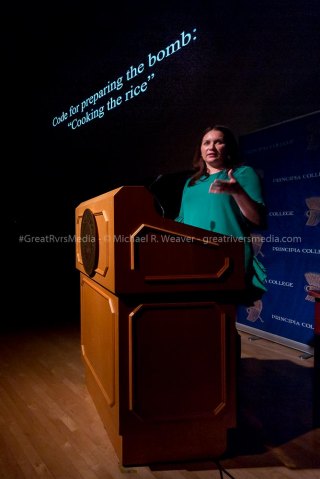
Q - Do you see this struggle ever ending or is this going to be a generational thing?
A - I think it's a generational thing I really do think that. I think that the sooner the politicians get their heads around that and start saying that, the problem is whoever says it first is going to be the guy who doesn't ever get re-elected. Nobody wants to elect the guy who says we can't fix this, we don't know how. I have no idea how to fix this right but that's the reality I don't think that anybody has figured out how to fix this. Everything we do like removing the territorial caliphate, drone strikes on their leaders, killing bin Laden to killing this leader it's not working and we don't completely understand why. The numbers just keep on growing.
It's not just the middle east, they're all over Europe but you know the FBI back in 2014 said there's investigations in all fifty states. So it's like this cancer that metastasizes. I certainly don't have an answer. The trend is that we consistently underestimate them and we consistently create expectations for the American people that end up being dashed. You know, I'm the one who's going to keep you safe, we're never going to have another ISIS attack, ISIS is going to be vanquished.
Q - If you could get a message to the people that live in this region, or most of the United States for that matter, what do you think from what you see is something that they should really come to grips with? Understand well in terms of getting where they get their news.
A - This is going to sound very unpopular but my advice to everyone in this country and beyond is get your news from legacy media institutions. Get your news from newspapers that are big and established, TV networks that are big and established because they're the only ones that have a net in place to fact check things. Mistakes will still be made but at the New York Times when I put out a story it's got to go through three different readers before it gets out. It's fact checked as much as you can. We still make mistakes and then the rule is we have to append a correction at the bottom. So when you read it the information is corrected and then there's a little explainer at the bottom saying on this date this change was made. That's not the case on Facebook or somebody's blog. For instance, after the Vegas attack I was struck by how many dozens of well meaning, not malicious, people would contact me and send me a link to Infowars and say "Have you seen this? What you think about it? I could tell that they weren't trying play me. They were just kind and concerned people who want to understand what happened and don't understand the difference between a conspiracy site and a real news organization.
Unfortunately we're now in a political climate where the term fake news is being thrown around. You know the executive branch is calling things like The New York Times fake news or losers. And so I think that further muddies the water and further confuses people. I was thinking back to my parents, you know I'm from Romania, I didn't grow up here. Imagine if I did, if my parents had been here in the 50's let's say or in the 60's. You had the major newspapers and you had you know the famous TV shows you know like the what is it the seven o'clock news or whatever with these stately respected Cronkite Walter types.
Q - Right. Cronkite got to the point that he does a news broadcast that says what we are doing is pointless in Vietnam. We can't do this anymore he said.
A - Oh interesting. Essentially you had much fewer outlets. And kind of a centralization of the news. What's happened on the one hand is exciting, you've seen this growth of all of these other things. You can listen to whatever you want to listen to. With citizen driven journalist there's no vetting of anything. I think that the citizen driven stuff is interesting. I like to see these people's opinions. People need to remember that these institutions that are now sadly being so maligned by people's words, They have a system in place that is there that is meant to protect the authenticity of the information and in this landscape that's the only thing that I think I can say.

